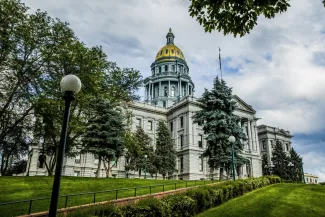
Colorado lawmakers weigh options for closing budget gap in free school meals program
Colorado’s voter-approved program to provide free meals to public school students will once again face a revenue gap next year as lawmakers face an already challenging budget year.
Voters approved Proposition FF, known as the Healthy School Meals for All initiative, in 2022. Its costs are supposed to be covered by an increase in the income tax rate for people who make more than $300,000 per year. But demand for the no-cost breakfast and lunches outpaced expectations, making the cost of the program higher than available revenue.
The program cost about $162 million in the 2023-2024 fiscal year, which the Legislature covered using some supplemental funding adjustments. It is projected to cost about $124 million for the 2024-2025 fiscal year, but available revenue is projected to be about $105 million, according to figures presented to the Joint Budget Committee this week.

© fotoguy22 - iStock - 1468912821
“There still appears to be a gap between revenue and projected expenditures,” Colorado Department of Education Commissioner Susana Córdova told lawmakers on Monday. “We’ll have more accurate projections in January that will incorporate the December forecast and reimbursement claims through this October.”
A technical advisory group for the program gave a series of options to lawmakers to make the budget equation work, including ideas to increase the retained revenue and ones to make cuts in the program.
“I am not in favor of cutting food to any kid, period,” Democratic Representative Shannon Bird said during a December 3 briefing on the advisory group report.
The options include cutting breakfast from the program or restricting it to only elementary and middle schoolers, the latter of which could save about $28 million. Another cost-cutting idea would be to limit the program to districts that have a high percentage of students eligible for free and reduced price lunch or that already qualify for the federal Community Eligibility Provision. That would eliminate between 25 percent and 60 percent of Colorado students from the program.
The advisory group, as well as lawmakers, indicated a stronger appetite for options that could increase revenue rather than cut program costs.
“Making sure that kids aren’t hungry when they’re trying to learn is a core service, and it’s one that we as a state need to fund,” Democratic Senator Jeff Bridges said.
That could look like a ballot measure in 2025 asking voters if the state can retain more money from the income tax change than originally allowed by the 2022 question. That would be about $26 million. The JBC has not historically sponsored bills that raise revenue, but an individual legislator could run it.
Lawmakers in charge of crafting the state budget next year are staring down the challenge of cutting nearly $1 billion while preserving crucial state services.
Colorado Newsline is part of States Newsroom, a nonprofit news network supported by grants and a coalition of donors as a 501c(3) public charity. Colorado Newsline maintains editorial independence. Contact Editor Quentin Young for questions: info@coloradonewsline.com.

















